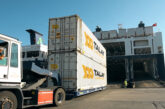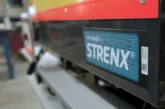Significant improvement in operating profit in the third quarter of 2020 compared with the previous quarter Successful introduction of Transform for Growth with expected cost savings of around €100 million from 2022 – restructuring costs of nearly €38 million recognized as an exceptional item in the third quarter

Further quarter-on-quarter improvement in business performance expected in the fourth quarter of 2020 – signs of an upward trend in the market
Vision of Success 2020: DEUTZ forges ahead with growth initiatives in spite of coronavirus
China strategy proving successful: joint venture with SANY already profitable; production volume expected to increase significantly in 2020 compared with the prior yea
“In line with our Vision of Success 2020 program, which we set out at the beginning of the year, we remain focused on pursuing our strategic growth initiatives despite the coronavirus pandemic and its economic implications. Over the coming months, we expect to see a recovery in our main sales markets. From a current perspective, however, it appears likely that they will need a long time to return to their pre-crisis levels,” says DEUTZ CEO, Dr. Frank Hiller.
Cologne, November 10, 2020 – DEUTZ, a leading global manufacturer of innovative drive systems, registered a sharp overall decline in business performance in the first nine months of 2020, which was in line with its expectations. This was due not only to the macroeconomic effects of the coronavirus crisis, which in an already challenging market environment made customers in various industries much less willing to invest and thus triggered a collapse in demand, but also, in particular, to the fact that customers were continuing to run down the inventories of engines they had built up before new emissions standards came into force. Furthermore, business operations were disrupted during the period under review as a result of a temporary production shutdown in April 2020 because of coronavirus.
In contrast to the sharp decline in DEUTZ’s engine business in the first nine months of 2020, the sales figures for the third quarter of 2020 were higher overall than those for the second quarter of the year. As a result, operating profit (EBIT before exceptional items) improved significantly compared with the previous quarter.
With regard to the China strategy, the joint venture with China’s largest construction equipment manufacturer SANY notched up its first successes: Not only is the joint venture already profitable, but it is set to increase its production volume from around 7,000 engines in 2019 to roughly 20,000 engines for 2020 as a whole. At the end of the second quarter of 2020, DEUTZ increased its revenue target for China for 2022 from approximately €500 million to around €800 million on the grounds that market demand is already on a par with the production volume planned for the joint venture and in light of the expected gains in market share.
Significant progress has also been made in the global expansion of the high-margin service business, which is a key pillar of the overarching growth strategy. For example, DEUTZ acquired the companies DEUTZ Austria GmbH, Motorcenter Austria GmbH, and Pro Motor Servis CZ s.r.o. at the beginning of the fourth quarter of 2020. These former subsidiaries of the Austrian company PRO MOTOR Beteiligungsgesellschaft mbH sell and service diesel engines in Austria, the Czech Republic, Hungary, Slovakia and Slovenia, and provide DEUTZ with direct access to the markets in these regions.
Improvement in sales in Q3 2020 compared with the previous quarter
In the first three quarters of 2020, new orders received by DEUTZ fell by 29.0 percent year on year to €933.6 million. New orders were down significantly in all the main application segments, not only because of the collapse in demand related to the coronavirus crisis but also due to the high level of new orders in the prior-year period as a result of customers building up their inventories of engines before new emissions standards came into force. Only the Miscellaneous segment recorded an increase in new orders, by 5.4 percent to €91.0 million, which was attributable to the exceptionally strong growth in orders for rail vehicle drive systems.
The volume of orders for the third quarter of 2020 was up by a significant 16.1 percent on the previous quarter. All application segments contributed to this improvement, with the exception of Stationary Equipment. As of September 30, 2020, orders on hand stood at €250.4 million (September 30, 2019: €375.2 million).
The DEUTZ Group sold a total of 108,559 engines in the reporting period, which was 30.3 percent fewer than in the first three quarters of 2019. Among the application segments, the only one with a significant increase in unit sales was Miscellaneous with a rise of 67.6 percent. This improvement was partly due to the ramp-up of trolling motors made by DEUTZ subsidiary Torqeedo, whose unit sales nearly doubled year on year after selling a total of 24,057 electric motors. The driving factors behind the drop in unit sales in the other application segments were generally weaker market demand and, in particular, adverse effects resulting from customers running down inventories of engines that had been purchased ahead of new emissions standards coming into force.
DEUTZ’s unit sales were up by 2.7 percent compared with the second quarter of 2020, mainly due to double-digit percentage increases in the Material Handling and Agricultural Machinery application segments. In terms of regions, this increase in unit sales was attributable to the Americas and the EMEA region.
As a result of the decline in unit sales, consolidated revenue was down by 32.7 percent to €928.2 million in the period under review, with all application segments and regions recording sharp falls in revenue.
Compared with the previous quarter, DEUTZ’s revenue advanced by 10.0 percent, with all regions contributing to this positive result. The performance of the individual application segments varied, however. Whereas revenue in Construction Equipment and Stationary Equipment failed to reach the level of the second quarter, the other application segments recorded double-digit increases in revenue.
Operating loss in Q3 2020 significantly lower than in the previous quarter
The economic impact of the coronavirus crisis on the business activities of the DEUTZ Group and its customers meant that DEUTZ reported an operating loss (EBIT before exceptional items) of €65.6 million in the first nine months of 2020. This significant decline compared with the prior-year period was attributable, in particular, to the fall in revenue and the resulting diseconomies of scale. There was also a heavy drag on operating profit from payments of nearly €10 million made under continuation agreements with suppliers that are going through insolvency proceedings and demand-related impairment losses of around €5 million recognized on capitalized development projects. However, there were some positive influences on earnings performance in addition to the general cost reductions and the use of short-time working: The Board of Management waived its one-year variable remuneration for 2020 and senior managers waived a substantial part of their variable remuneration for 2020. The EBIT margin before exceptional items stood at minus 7.1 percent in the reporting period, compared with 5.0 percent in the prior-year period. The operating loss for the third quarter of 2020 was significantly lower than for the previous quarter.
At the start of the year, DEUTZ launched a Company-wide efficiency program, Transform for Growth, in order to secure its earnings performance in a challenging market environment. In the third quarter of 2020, restructuring costs totaling €37.8 million were recognized as an exceptional item after some of the individual measures were set out in greater detail. These costs, which mainly relate to restructuring-related provisions, are within the anticipated range of €35 million to €40 million.
After taking exceptional items into account, EBIT for the period under review stood at minus €103.4 million. The decline in EBIT caused net income to deteriorate to a net loss of €104.5 million. The positive change to the income tax situation was predominantly attributable to deferred tax income. Earnings per share amounted to minus €0.86 compared with €0.45 in the prior-year period. Net income before exceptional items stood at minus €68.3 million (Q1–Q3 2019: €46.8 million). Earnings per share before exceptional items came to minus €0.57 compared with €0.39 in the prior-year period. New orders in the DCE segment for the first nine months of 2020 fell by 35.2 percent year on year to €660.4 million. In the same period, unit sales declined by 42.2 percent to 70,826 engines and revenue contracted by 38.1 percent to €668.6 million. Among the application segments, only the service business recorded a year-on-year increase in revenue with a modest rise of 0.3 percent.
Due to the collapse in demand, mainly as a result of the coronavirus crisis, the operating loss for the segment amounted to €67.6 million, a significant deterioration of €113.4 million compared with the operating profit recorded in the prior-year period. As well as a sharp fall in revenue, the segment’s earnings performance was weighed down by payments to suppliers going through insolvency proceedings and by impairment losses on a development project. The payments to suppliers were intended to enable them to continue supplying DEUTZ, while the impairment losses were recognized due to the anticipated decrease in demand for the affected engine series. The EBIT margin before exceptional items stood at minus 10.1 percent in the reporting period, compared with 4.2 percent in the prior-year period.
The DCS segment’s sales figures also deteriorated in the period under review: New orders in the segment were down by 9.7 percent to €241.3 million. Unit sales decreased by 32.1 percent to 13,676 engines, while revenue fell by 18.3 percent to €225.8 million as a result of a downward trend in all application segments. The much smaller decline in revenue, relative to the decline in unit sales, was mainly the result of the service business accounting for a higher proportion of segment revenue.
As a result of the decline in revenue, the operating profit for the segment dropped by a significant €26.7 million year on year to €10.9 million. The segment’s earning performance was also weighed down by impairment losses on two development projects that were recognized due to the expected decrease in demand for the affected engine series. The EBIT margin reached 4.8 percent, compared with 13.6 percent in the prior-year period.
The Other segment includes not only Torqeedo’s business with electric motors for boats but also the battery specialist Futavis GmbH, which was acquired in October 2019. Overall, the segment’s business performance was positive in the first three quarters of 2020: New orders rose by 8.6 percent compared with the prior-year period to reach €34.0 million. Unit sales surged by 85.2 percent in the period under review, partly because of the ramp-up of smaller trolling motors at Torqeedo. Segment revenue grew by 35.5 percent to €35.9 million. The lower increase in revenue, relative to the increase in unit sales, was mainly the result of negative product mix effects in connection with the aforementioned ramp-up at Torqeedo.
The operating loss for the segment improved by €5.3 million year on year to minus €8.9 million. This was partly attributable to the deconsolidation of the joint venture DEUTZ AGCO Motores S.A., Haedo, Argentina, in the first half of 2019. As part of the deconsolidation, which was carried out for reasons of materiality, cumulative negative exchange differences were reclassified from equity to the income statement, which had a significant adverse impact on the segment’s earnings in the prior-year period. The EBIT margin thus improved from minus 53.6 percent in the first three quarters of 2019 to minus 24.8 percent in the equivalent period of 2020.
Further improvement in business performance expected in the final quarter of 2020
Because of the ongoing uncertainty as to how the coronavirus crisis will progress, it remains difficult to predict how this will affect the global economy in the final part of 2020. It is therefore still not possible to present quantitative guidance for the year as a whole.
Nevertheless, it can be assumed that the performance of the business in the fourth quarter of 2020 will continue to be adversely affected by the coronavirus crisis, although to a lesser extent than in the third quarter. In the final quarter of 2020, DEUTZ therefore expects both its sales figures and its operating profit (EBIT before exceptional items) to see a further quarter-on-quarter improvement. The Company expects to see a recovery in its main sales markets over the coming months. From a current perspective, however, it appears likely that these markets will need a long time to return to their pre-crisis levels. With regard to the positive exceptional item of around €60 million that DEUTZ had been expecting to register once it received the final installment of the purchase price for the sale of the Cologne-Deutz site, the assumption remains that the payment will be made in 2021. However, both the exact amount and the date of payment are dependent on the development plan for the site being formally adopted and, as such, cannot be determined with any degree of precision.
Global efficiency programm »Transform for Growth« underway
At the start of the year, DEUTZ launched a Company-wide efficiency program, Transform for Growth, in order to further secure its earnings performance in a challenging market environment and maintain its long-term competitiveness. An extensive and detailed action plan was drawn up in the second quarter. The main areas of action in addition to the optimization of the global production network and the automation and digitalization of operational and administrative processes are the streamlining of the groupwide organizational structure and the reduction of complexity coupled with an optimized use of global structures, for example shared services.
By taking these measures, DEUTZ hopes to generate total annual cost savings of around €100 million, with the full effect expected to be achieved from 2022 onward. As well as adjusting operating costs, a large part of the savings are to be achieved by reducing staff costs. This will involve a reduction of up to 1,000 positions across the Group. In the third quarter of 2020, as part of this initiative, DEUTZ reached agreement with the employee representatives on a key issues paper, which includes a voluntary program running from September 1, 2020 to March 31, 2021, that will facilitate a reduction in the number of employees at the German sites by up to 350 while minimizing the social impact.
As of September 30, 2020, 4,5754 people were employed by the DEUTZ Group worldwide, which was 331 fewer than at the end of 2019. The overall headcount reduction came to 492 after factoring in the volume-driven reduction in the number of temporary workers by a total of 161.
In the third quarter of 2020, the Company recognized expenses of €37.8 million that were predominantly related to personnel measures in connection with the restructuring planned as part of the efficiency program. The recognition of provisions accounted for €37.1 million of this.


![MAN BANNER – 13oca26 13sbt çıkış [ad id='38440'] 41tıklamadan devam](https://tasiyanlar.com/wp-content/uploads/2026/01/MAN_WebBanner_Tasiyanlar_TGX2025_1200x110-1.gif)
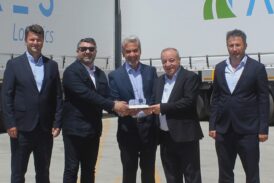

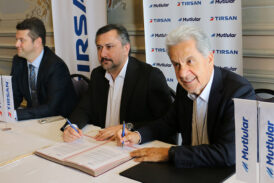
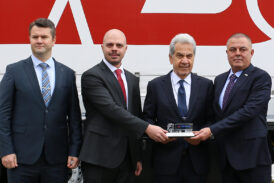

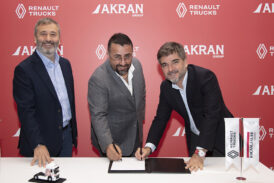
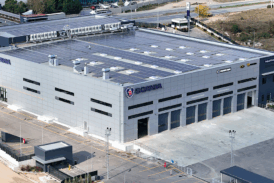
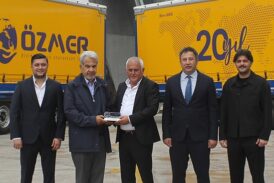
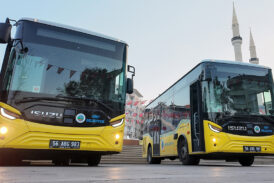
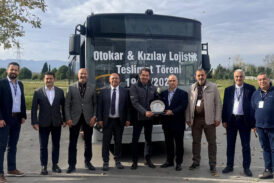
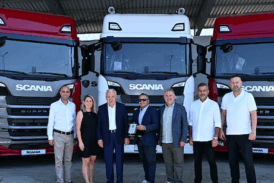

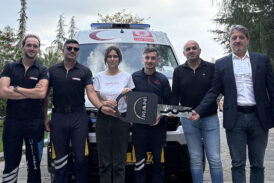
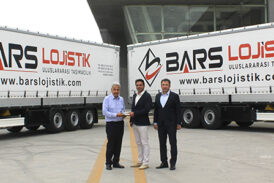
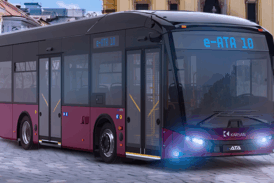
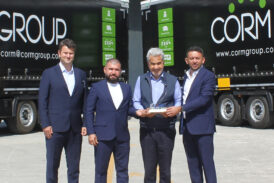
![1/C Reklam CUMMINS[ad id='5542']](https://tasiyanlar.com/wp-content/uploads/2025/05/On-HighwayDigitalBanner_PowerOnward_April25_1200x110px_Turkish_1.2_5.jpg)

